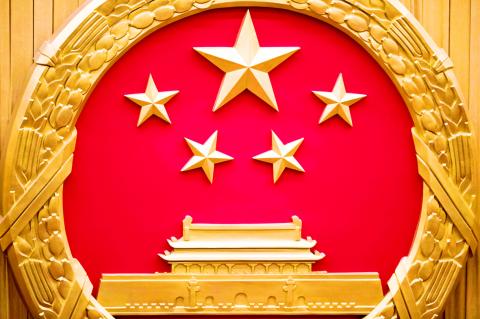China has called on the US to “correct its mistake” after US President Donald Trump approved new rules allowing top-level US officials to travel to Taiwan to meet with their Taiwanese counterparts.
US representatives can already travel to Taiwan and Taiwanese officials occasionally visit the White House, but meetings are usually low profile to avoid offending China.
The Taiwan Travel Act, which Trump signed on Friday following its passage in the US Congress, encourages visits between Taiwanese and US officials “at all levels.”

Photo: AFP
Washington cut formal diplomatic ties with Taiwan in 1979 in favor of Beijing under its “one China” policy, but it maintains trade relations with Taiwan and sells it weapons.
Chinese Ministry of Foreign Affairs spokesman Lu Kang (陸慷) said the act’s clauses, while not legally binding, “severely violate” Beijing’s “one China” principle and send “very wrong signals to the ‘pro-independence’ separatist forces in Taiwan.”
“China is strongly opposed to that,” Lu said in a statement issued on Saturday.
“We urge the US side to correct its mistake, stop pursuing any official ties with Taiwan or improving its current relations with Taiwan in any substantive way,” he said.
In a separate statement, Chinese Ministry of National Defense spokesman Colonel Wu Qian (吳謙) said the act “interferes in China’s internal affairs.”
China urges the US to “stop pursuing any US-Taiwan military ties and stop arms sales to Taiwan, so as to avoid causing serious damage to the bilateral and military relations between China and the US, and to the peace and stability in the Taiwan Strait,” Wu’s statement said.
The act describes Taiwan as “a beacon of democracy” in Asia, and states that “Taiwan’s democratic achievements inspire many countries and people in the region.”
Trump’s signature, announced late on Friday — when the White House usually tries to bury news — comes amid increasing tensions between Taiwan and China.
The new US law also comes amid trade tensions between Washington and Beijing as Trump mulls fresh tariff measures that have raised fears of a tit-for-tat trade war.

CHAOS: Iranians took to the streets playing celebratory music after reports of Khamenei’s death on Saturday, while mourners also gathered in Tehran yesterday Iranian Supreme Leader Ayatollah Ali Khamenei was killed in a major attack on Iran launched by Israel and the US, throwing the future of the Islamic republic into doubt and raising the risk of regional instability. Iranian state television and the state-run IRNA news agency announced the 86-year-old’s death early yesterday. US President Donald Trump said it gave Iranians their “greatest chance” to “take back” their country. The announcements came after a joint US and Israeli aerial bombardment that targeted Iranian military and governmental sites. Trump said the “heavy and pinpoint bombing” would continue through the week or as long

TRUST: The KMT said it respected the US’ timing and considerations, and hoped it would continue to honor its commitments to helping Taiwan bolster its defenses and deterrence US President Donald Trump is delaying a multibillion-dollar arms sale to Taiwan to ensure his visit to Beijing is successful, a New York Times report said. The weapons sales package has stalled in the US Department of State, the report said, citing US officials it did not identify. The White House has told agencies not to push forward ahead of Trump’s meeting with Chinese President Xi Jinping (習近平), it said. The two last month held a phone call to discuss trade and geopolitical flashpoints ahead of the summit. Xi raised the Taiwan issue and urged the US to handle arms sales to

BIG SPENDERS: Foreign investors bought the most Taiwan equities since 2005, signaling confidence that an AI boom would continue to benefit chipmakers Taiwan Semiconductor Manufacturing Co’s (TSMC, 台積電) market capitalization swelled to US$2 trillion for the first time following a 4.25 percent rally in its American depositary receipts (ADR) overnight, putting the world’s biggest contract chipmaker sixth on the list of the world’s biggest companies by market capitalization, just behind Amazon.com Inc. The site CompaniesMarketcap.com ranked TSMC ahead of Saudi Aramco and Meta Platforms Inc. The Taiwanese company’s ADRs on Tuesday surged to US$385.75 on the New York Stock Exchange, as strong demand for artificial intelligence (AI) applications led to chip supply constraints and boost revenue growth to record-breaking levels. Each TSMC ADR represents

State-run CPC Corp, Taiwan (CPC, 台灣中油) yesterday said that it had confirmed on Saturday night with its liquefied natural gas (LNG) and crude oil suppliers that shipments are proceeding as scheduled and that domestic supplies remain unaffected. The CPC yesterday announced the gasoline and diesel prices will rise by NT$0.2 and NT$0.4 per liter, respectively, starting Monday, citing Middle East tensions and blizzards in the eastern United States. CPC also iterated it has been reducing the proportion of crude oil imports from the Middle East and diversifying its supply sources in the past few years in response to geopolitical risks, expanding